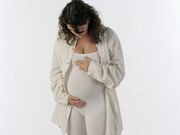

There’s been speculation that a daily vitamin D supplement taken in pregnancy might lower the odds for asthma in children. However, two new studies find no evidence for such an effect.
One study “did not show a statistically significant effect on the primary end point of persistent wheeze,” concluded a team led by Dr. Hans Bisgaard of the University of Copenhagen in Denmark.
However, experts stressed that a longer, larger trial might be needed to see a benefit for babies when mothers take a vitamin D supplement in pregnancy.
Both studies are published in the Jan. 26 issue of the Journal of the American Medical Association.
As stated in a journal news release, rates of childhood asthma and vitamin D deficiency are rising in Western nations. And there’s been speculation that vitamin D deficiency during pregnancy may affect immune system development in the fetus, leading to an increased risk of asthma in childhood.
Vitamin D is often called the “sunshine vitamin,” because the body typically makes the nutrient as sunlight contacts the skin. Vitamin D is also found in certain foods.
“Since we spend more time indoors with limited sun exposure, especially during the winter, we often require oral supplementation of vitamin D to maintain adequate levels,” said one expert, Dr. Alan Mensch. He is chief of pulmonary medicine at Northwell Health’s Plainview Hospital in Plainview, N.Y.
“Recent observations have also suggested an association between low umbilical cord levels of vitamin D at birth and subsequent childhood asthma,” Mensch said.
To try the clarify any link, Bisgaard’s team tracked outcomes for more than 600 pregnant women and their children. The children were followed until they were 3 years old.
Taking vitamin D supplements during pregnancy did not reduce the children’s risk of asthma, chronic wheezing, upper and lower respiratory tract infections, or the autoimmune skin disorder eczema, Bisgaard and colleagues said.
However, the researchers believe that further studies may be required to reach a final conclusion on the issue. Those studies would ideally have more participants, involve a higher vitamin D dose, and begin supplementation earlier in pregnancy, the team said.
The second study included nearly 900 pregnant women deemed to already be at high risk of having children with asthma. Beginning at 10 to 18 weeks of pregnancy, the women started taking either 4,000 IU of vitamin D plus a prenatal vitamin containing 400 IU of vitamin D each day, or a placebo plus a prenatal vitamin containing 400 IU of vitamin D.
By age 3 years, 24 percent of the children in the 4,400-IU group and 30 percent of those in the 400-IU group developed asthma or chronic wheezing, the researchers reported. But, this 6 percent difference was not deemed to be statistically significant, according to a team led by Dr. Augusto Litonjua of Brigham and Women’s Hospital in Boston.
However, Litonjua agreed that longer follow-up of the children in this study, as well as larger studies, are needed to answer whether vitamin D supplementation during pregnancy can reduce the risk of childhood asthma.
“So what should our current recommendations be?” Mensch said. He believes that “larger and modified studies are required before firm recommendations can be made for pregnant women.”
However, since there doesn’t seem to be any harm in taking a vitamin D supplement in pregnancy, certainly women can choose to do so, Mensch said.
Another expert agreed.
“While there is no proven benefit of vitamin D supplementation for reductions of asthma in the offspring of pregnant women, this vitamin deficiency nevertheless is widespread in the population,” said Dr. Len Horovitz, a pulmonary specialist at Lenox Hill Hospital in New York City.
“Certainly the benefit of vitamin D to bone growth in the fetus is understood, and we know that vitamin D helps the immune system and wound healing,” Horovitz added.
More information
The American Academy of Pediatrics has more about asthma.
Source: HealthDay
Copyright © 2024 HealthDay. All rights reserved.

Leave a Reply